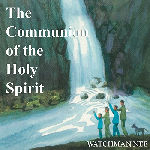Spiritual Order For the Church
by Clarence Bouwman
Summary
This is a quite extensive work on church polity from a Reformed perspective (which I would assume they have a tendency towards Presbyterian polity).

Watchman Nee The Communion of the Holy Spirit is a 3 part, 15 Chapter work on various matters of the Holy Spirit. From the Deeper Life Movement
PDF:Watchman Nee The Communion of the Holy Spirit.
theWord:Watchman Nee The Communion of the Holy Spirit.
MySword:Watchman Nee The Communion of the Holy Spirit.
eSword:Watchman Nee The Communion of the Holy Spirit.
- Key to the Church Order of the Free Reformed Churches of Australia
- Key to the Church Order of the Canadian Reformed Churches
Evaluation by David Cox
This is another important document in the Dutch Reformed Church, and this document would hold importance for Reformed and Calvinist students in general. The document is arranged in 81 articles and 3 appendices. It would define the break between the Catholic Church and the Dutch Reformed, looking at arguments against Papal authority. This would make the work good for people seeking information on Catholicism or the Reformation. There are parts on Lutheran Church Government, as well as general definitions of elders, ministers, deacons, offices, etc. within church government in general. So students of church polity might be interested in this work as well.
Chapter Content
Introduction
Part I: From the Bible to the Church Order
Chapter 1 Scripture Principles Forming Reformed Church Polity
1. Understanding the Concept
1.1 Christ is Master in Church
1.2 How Does Christ Rule His Church?
1.3 Church Polity Defined
2. Christ’s Authority is Entrusted to the Local Church
2.1 The Authority of the Apostles
2.2 The Authority of their Replacements
2.3 The Principle of Local Authority
3. Towards a Bond of Churches
3.1 From One Church to Many Churches
3.2 Churches are Autonomous but Not Independent
3.3 Churches Need to Federate Together
3.4 To Join a Bond of Churches is Voluntary
Chapter 2
Historical Overview of Church Government
1. Papal Church Government
1.1 Pressures on the Eldership in the Early Churches
1.2 Developments in the Eldership
1.3 Characteristics of Papal Church Government
2. Lutheran Church Government
2.1 Rejection of Papal Authority
2.2 Replacement by a New Authority Structure
2.3 Characteristics of Lutheran Church Government
3. Reformed / Presbyterial Church Government
3.1 Martin Bucer
3.2 John Calvin
3.3 Elder Centred
3.4 Characteristics of Reformed Church Government
4. Congregationalism / Independentism
4.1 Development
4.2 Characteristics of Congregational Church Government
5. Collegialism
5.1 Development
5.2 Characteristic of Collegial Church Government
Chapter 3
Development of Church Polity in the Netherlands
1. Background History
2. The Convent of Wezel, 1568
2.1 Principle 1: No Lording over Others
2.2 Principle 2: The Need for Ecclesiastical Assemblies
3. From Wezel to Emden
4. The Synod of Emden, 1571
5. The Synod of Dort, 1618-1619
Part II: The Roots of the Church Order in the Bible
The Church Order
Chapter 4
Offices and Supervision of Doctrine Articles 2-27
1. The Offices
1.1 Elders
1.2 Ministers
1.3 Deacons
2. The Calling to Office
2.1 Who calls to office?
2.2 How is a person called to office?
2.3 Who is eligible to be called to office?
2.4 Preparation for Ordination
2.5 The Place the Call is Exercised
2.6 Equality of the Called
2.7 Duration of the Call
2.8 Material Support for the Office-bearer
3. The Work of the Office-bearers
3.1 Elders – Ruling and Teaching
3.2 Deacons
3.3 Office-Bearers and the Government
Chapter 5
Articles 28-50
1. Development of Assemblies
2. Legitimacy of the Assemblies
3. Nature of the Assemblies
3.1 Consistory
3.2 Classis
3.3 Synod
3.4 Regional Synod
4. Relationship Between the Assemblies
5. Delegation to Major Assemblies
6. Frequency of Assemblies
6.1 Consistory
6.2 Classis
6.3 Synod
6.4 Regional Synod
7. Tasks of the Assemblies
7.1 Consistory
7.2 Classis
7.3 Regional Synod
7.4 General Synod
8. Other Matters Pertaining to Assemblies
8.1 Prayer and Censure
8.2 Tasks of the chairman and clerk I Record Keeping
8.3 Constitution of a Consistory /Places without a Consistory
8.4 Mission Work
9. Assemblies in the FRCA without Formal Classes
Chapter 6
Worship, Sacraments and Ceremonies
Articles 51-68
1. Worship
1.1 Church Services on the Lord’s Day
1.2 Two Church Services Per Sunday
1.3 Singing in the Worship Services
2. Sacraments
2.1 Baptism
2.2 The Lord’s Supper
3. Records and Attestations
3.1 Church Records
3.2 Attestations
4. Other Items
4.1 Ecclesiastical Feast Days
4.2 Days of Prayer
4.3 Marriage
4.4 Funerals
Chapter 7
Church Discipline
Articles 69-79
1. The Need for Church Discipline
1.1 The Church is Holy
1.2 Sin May Have No Place in the Church
1.3 The Wages of Sin is Death
2. The Purpose of Church Discipline
3. Who Must Exercise Church Discipline?
4. Against Whom must Church Discipline be Administered?
5. What Sins are Worthy of Church Discipline?
6. The ‘How’ of Church Discipline
6.1 Determination of Repentance
6.2 Discipline of Communicant Members
6.3 Congregational Involvement
6.4 Purpose Achieved
6.5 Discipline of Non-communicant Members
7. Sin Amongst Office-Bearers
7.1 Manner of Discipline
7.2 Which Sins require Suspension?
7.3 Mutual Discipline
Chapter 8
Concluding Articles
Articles 80, 81
1. Principle 1: No Lording over Others
2. Principle 2: Observance and Revision of the Church Order
2.1 Observance of the Church Order
2.2 Revision of the Church Order
Appendices
Appendix 1 Church Order of Dort (as adopted in 1618-1619)
Appendix 2 Church Order of the Free Reformed Churches of Australia
Appendix 3 Church Order of the Canadian Reformed Churches
Donate a Cup of Coffee to Me

It takes a lot of work, energy, time, and money to create, maintain, protect, and make new works constantly. While you may benefit from all my work only spending 5 minutes a week, it takes me hours and hours, and hackers attacking, many more. Just $5 dollars goes a long way to cover my financial burden of managing this site.
Click to donate any amount.
MySwordmodules is a website dedicate to the MySword Bible Program for Androird devices. We host MySword Modules.

Helping Returning Missionaries are my thoughts and suggestions for missionaries returning on furlough to the States, also those on deputation.
Topics: How are we helping returning missionaries? | Let me put forth my mindset. | Coming Home and Culture Shock | The Problems of Cyber Space and Missionaries | Stick to Standard Forms of Communication | You can Help Returning Missionaries by understanding their lifestyle | More Lifestyle Differences | Helping Missionaries with Dental, Eyecare, Medical Care | Churches can help Returning missionaries - Housing | Small stuff | Get expert Advice | My Best Experiences with Visiting a Church as a Missionary Speaker.
Read the Article: Helping Returning Missionaries.


Can not download Bouman
Bouwman – Spiritual Order for the Church now fixed. Thanks for bringing this to my attention.